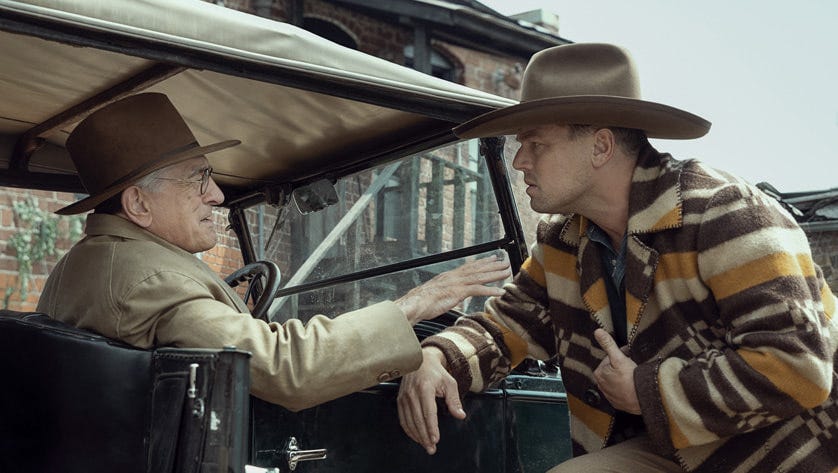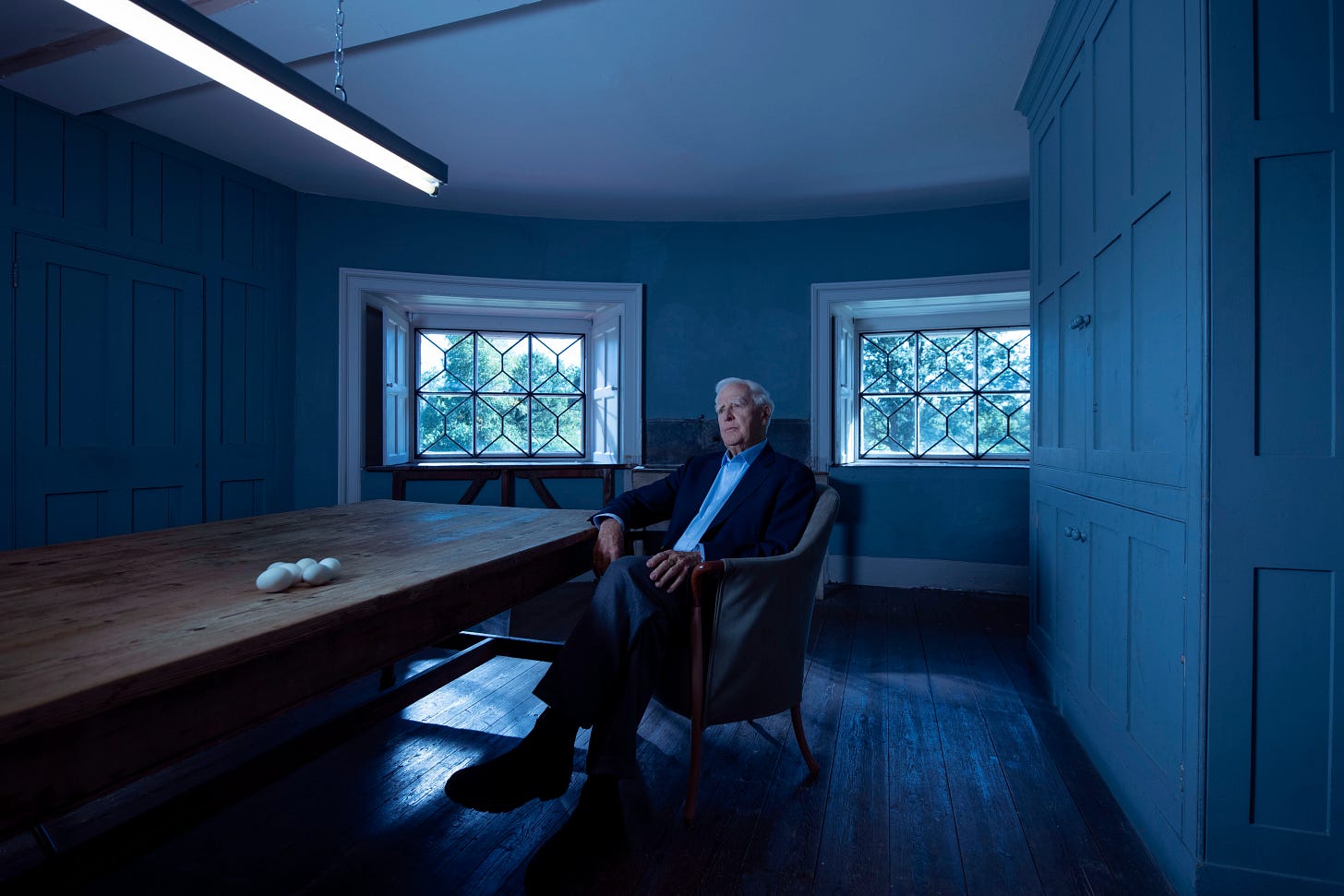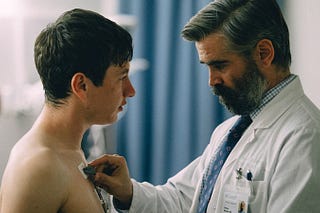
In Review: 'Killers of the Flower Moon,' 'The Pigeon Tunnel'
Two major filmmakers step up this week as Martin Scorsese's epic Western details a spate of killings in oil-rich Osage territory in the '20s and Errol Morris's new doc profiles the late John le Carré.
Killers of the Flower Moon
Dir. Martin Scorsese
206 min.
For as much time as Martin Scorsese has spent illuminating the darker corners of America—the subcultures, the fringe-dwellers, the internecine tribal skirmishes—he has been telling his own story of how America operates, in all its ugly ironies and hypocrisies. Here’s a society that celebrates a killer like Travis Bickle in Taxi Driver for murdering a pimp instead of a politician, even though he makes no such distinction; that condones the capitalist raiders of Las Vegas (Casino) and Manhattan (The Wolf of Wall Street) over the gangsters and misfits who play the same game; and that understands immigration as a “melting pot” that looks more like the trench warfare of Gangs of New York. Scorsese may be our premier cinematic anthropologist, but he’s also a secret historian.
With Killers of the Flower Moon, his devastating adaptation of David Grann’s nonfiction account of a spate of murders in the oil-rich Osage territory in 1920s Oklahoma, Scorsese turns that subtext into text. As the country’s far-right politicians work to scrub the curriculum of any historical misdeeds that might discomfort white children, Scorsese has made an epic Western about the subtle (and not-so-subtle) white supremacy that our myth-makers seek to cover like bodies in the Nevada desert. It’s not even the murders themselves that are so upsetting as much as the idea that the Osage people are simply not entitled to the wealth this land has given them. The money has to be moved in the proper direction.
That’s certainly the position held by William Hale (Robert De Niro), a powerful rancher who likes to be called “King” and has the reputation of a benevolent royal, known for his charitable acts and his special standing within the Osage community. King claims to have no stake in the oil business and his deference to the Osage, reflected in his understanding of their culture and language, makes him a natural bridge between the tribe and the white settlers in their midst. But he’s merely the largest and most insidiously evil vulture circling the territory, quietly managing a conspiracy to siphon Osage money through a series of machinations involving bankers, insurers, undertakers, and goons. And who’s going to stop him? The country has already made it abundantly clear how it feels about the lives and livelihoods of indigenous people.
In perhaps his most audacious narrative gambit, Scorsese and his co-screenwriter, Eric Roth, place a toxic love story at the center of the picture, like the throbbing of a diseased heart. As Ernest Burkhart, a directionless World War I veteran with a certain dumb charm and a sensualist’s greed, Leonardo DiCaprio puts a sinister twist on his romantic heroes of the past, capable of authentic feeling yet unbothered by conscience. His uncle King recognizes Ernest’s conformist nature immediately and encourages him to court Mollie (Lily Gladstone), an Osage woman whose sisters are already married to other white men. Though the Osage have taken steps to keep mineral rights within the tribe, access to their money is mediated by white guardians and, of course, death can put men like Ernest in line for the inheritance.
Mollie is not an idiot. She can read Ernest’s intentions as if he were a cartoon character with dollar signs on his eyelids. (She calls him a “coyote,” albeit playfully.) She can also see that his affection for her is real and, over time, she returns it in kind. The two can enjoy their material life together and start a family. What she doesn’t grasp is the extent to which Ernest’s contradictory nature is poisoning their relationship—quite literally after a certain point—or his connection to the deaths, violent or mysterious, that have befallen her family. It takes a lot of them, as well as a visit to Washington D.C., to bring an agent (Jesse Plemons) and his men from the new “Bureau of Investigations” to sort out the mess.
The sheer brazenness of the criminality, like investing in a life insurance policy on a man who will soon be lifeless, recalls the penny-stock conquistadors in The Wolf of Wall Street and for a similar reason: No consequences are expected. King and his associates, as well as the other white power brokers in town, start from the premise that the Osage are not entitled to their money. It was an accident that this godforsaken terrain happened to be sitting atop a gold mine, and taking it from the Osage is a corrective action. News about the massacre of “Black Wall Street” in Tulsa circulates presciently a few times in the film, and it’s as if racial violence has ripped through Osage like an Oklahoma tornado.
Sprawled across a massive canvas—Scorsese has a William Hale-like talent for redirecting tech money into his productions—Killers of the Flower Moon is a modern Western with real political muscle, but it’s nonetheless scaled down where it needs to be, exploring relationships tangled up in greed, misplaced loyalty, and vicious racial and cultural forces. DiCaprio and De Niro develop a fascinating alchemy as co-conspirators, but Gladstone’s Mollie is the quiet soul of the film, observing more often than speaking as Mollie invests her empathy and faith in the wrong people. The film builds in momentum as the tragedy escalates, but it’s not until an astounding denouement that Scorsese’s point about American storytelling registers fully. Our history is often the lies we tell ourselves, the truths we bury, and the legends we print. — Scott Tobias
Killers of the Flower Moon opens everywhere this weekend. It will eventually come to Apple TV+, but c’mon people. See it projected.
The Pigeon Tunnel
Dir. Errol Morris
94 min.
“You discover early that there is no center to a human being,” David Cornwell, the writer better known by the pen name John le Carré, tells Errol Morris early in The Pigeon Tunnel, a documentary adaptation of le Carre’s 2016 memoir of the same name. It’s a bold, distressing claim le Carré tosses off as casually as if he were placing a sandwich order, suggesting he’d arrived at this hard knowledge a long time ago and has lost the ability to be unsettled by it. Nonetheless, it’s an observation that hangs over the entirety of the film. Did le Carré reach this conclusion as a result of immersing himself in secret worlds, first as the son of a con man, then as an intelligence operative, then, most famously, as the author of spy novels? Or did his time in these worlds offer him grim insights unavailable to the rest of us?
As usual, Morris lets his subject do most of the talking, and le Carré has quite the story to tell. The Pigeon Tunnel moves freely throughout its subject’s life, with extended stops in le Carré’s time as an intelligence operative and author. But all roads inevitably lead back to le Carré’s childhood. Abandoned by his mother, le Carré was raised largely by his con man father, Ronnie Cornwell. After seemingly giving the matter a lifetime of thought, le Carré has concluded his father’s skill at charming marks was made possible by an ability to commit himself so thoroughly to the scam of the moment that he believed his own lies. And for Ronnie, everyone was a mark, even his own son after le Carré’s literary career made him a wealthy man.
A reflexive suspicion of others’ motivations helped set le Carré up for life as a spy. Disillusionment soon followed, first by a distrust of the legitimacy of the Cold War; then a growing sense that intelligence agencies, like history, were fundamentally chaotic; and finally by the 1963 defection of Kim Philby, an MI6 operative revealed as a KGB spy. Philby served as model for the villain of Tinker, Tailor, Soldier, Spy, and his betrayal haunts le Carré’s fiction, just as it haunted British intelligence. Morris’s film depicts Philby’s defection as part of a history of betrayal that informs le Carré’s grim novels, a national scandal that echoes Ronnie Cornwell’s double life and his son’s own betrayal of an idealistic college friend whose communist group le Carré infiltrated. To be a spy, he later suggests, is to live in a state of “self-imposed schizophrenia.”
Le Carré, who died in 2020 at the age of 89, begins The Pigeon Tunnel with his back up, questioning Morris’s motivations based on his observations of the documentarian’s past work. (“Sometimes you’re a spectral figure, sometimes you’re God, and sometimes you’re present.”) But while he shuts down any questions about his messy personal life before Morris even raises them, le Carré soon settles into the familiar role of insightful, pessimistic storyteller, revisiting his past from the perspective of an aging man with nothing left to lose. It’s a fascinating tale, expertly steered by Morris’s questions and served well by a hypnotic score co-written by Philip Glass and Paul Leonard-Morgan and the director’s now-trademark style of mixing interview footage with relevant images—here a combination of news clips, archival photos, and scenes from adaptations of le Carre’s fiction. Whether not this confessional mode, too, is one final pose rather than the revelation of the author’s true self remains unclear. It’s not hard to figure out how le Carré would view it, however. —Keith Phipps
The Pigeon Tunnel starts streaming tomorrow on Apple TV+.




















206 minutes...
Scott, what's the bathroom strategy?
"Killers of the Flower Moon opens everywhere this weekend. It will eventually come to Apple TV+, but c’mon people. See it projected."
going tomorrow afternoon! so excited about the reviews this is getting